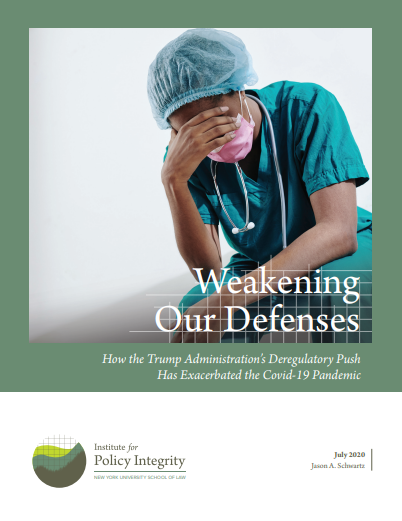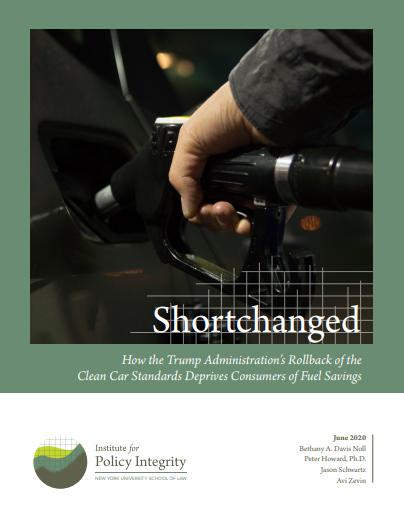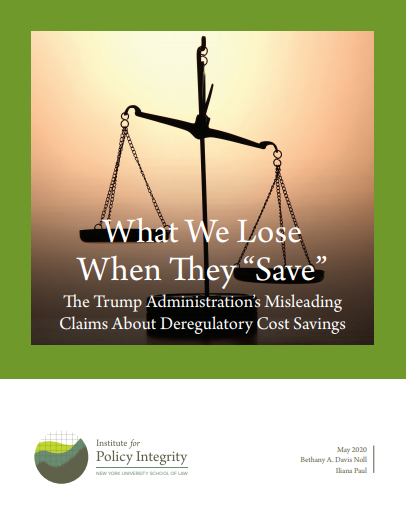-
Comments to Department of Labor on Rule Limiting ESG Investments
The Department of Labor proposed a rule that would impose limitations on investors’ ability to choose investments in Environmental Social and Governance (ESG) strategies. We worked with the Environmental Defense Fund to submit comments focusing on the proposal’s flaws.
-
Weakening Our Defenses
How the Trump Administration’s Deregulatory Push Has Exacerbated the Covid-19 Pandemic
The failure of the federal government to adequately safeguard the health, environment, and economy of the United States with efficient regulatory protections is not a new phenomenon. For over three years now, the Trump administration has systematically delayed, undermined, and erased key regulations that protect our health, our environment, our workplaces, our living conditions, and our economy. The steady erosion of regulatory safeguards has severely compromised our baseline defenses against Covid-19.
-
Amicus Brief on EPA’s Revocation of the California Auto Emissions Waiver
We filed a brief in the D.C. Circuit supporting a challenge to the Environmental Protection Agency’s (EPA) decision to revoke the waiver of preemption that allowed California (and more than a dozen states following California's standards) to set critical auto emission standards to further restrict greenhouse gases and other harmful air pollutants. EPA wrongfully concluded that it has virtually unconstrained authority to revoke a preemption waiver under Section 209(b) of the Clean Air Act. We explain how the agency overlooks key countervailing principles and misconstrues the purpose and mechanics of the waiver provision.
-
Comments to EPA on Delay of Emissions Rule for Wood Heaters
The Environmental Protection Agency (EPA) is proposing to amend the 2015 New Source Performance Standards (NSPS) for residential wood heating devices, purporting to respond to retailer needs in the wake of the COVID-19 pandemic. Our comments detail how how the proposal contradicts the Clean Air Act’s mandate and longstanding agency guidance. The proposed rule will, even under the agencies’ own analysis, cause net harms to the public without providing any reasonable justification.
-
Amicus Brief on Revisions to the Supplemental Nutrition Assistance Program
Under recent revisions to the Supplemental Nutrition Assistance Program, nearly 700,000 current beneficiaries would lose eligibility—harming the health of those individuals and likely causing economic disruption in the food sector. We filed an amicus brief in a federal lawsuit challenging the rule, detailing how the Department of Agriculture’s analysis fails to assess the profound and widespread costs of substantial disenrollment from SNAP assistance. Our brief was cited several times in the State Plaintiffs' reply brief to support their argument that the federal government did not adequately consider the indirect costs of the rule.
-
Comments on Oklahoma’s Medicaid Waiver
The Oklahoma Health Care Authority has requested permission from the U.S. Department of Health and Human Services to change the state’s Medicaid program in a variety of ways—including by introducing work requirements and premium payments for some beneficiaries. We filed comments opposing the request and explaining why the benefits, if any, of work and cost-sharing requirements are unlikely to justify the accompanying health and administrative costs.
-
Comments to FERC on NERA Net Metering Petition
The New England Ratepayers Association (NERA) recently petitioned the Federal Energy Regulatory Commission (FERC) to effectively overturn net metering policies nationwide. While FERC has previously and definitively answered the jurisdictional question concerning net metering, NERA asserts without evidence that controversy persists. We submitted comments describing the flaws of NERA’s argument and urging FERC to reject the petition.
-
Comments to HHS on Blood Donation Policies
The Department of Health and Human Services (HHS) asked for public input on a forthcoming report to Congress regarding strategies for ensuring an adequate blood supply during public health emergencies. Our comments recommended that the report endorse elimination of the Food and Drug Administration’s deferral policy for donations from men who have sex with men. The policy, which bars gay and bisexual men from donating blood for three months from the date of their last sexual contact, relies on outdated science regarding HIV transmission risk, stigmatizes gay and bisexual men, and increases the likelihood of blood shortages.
-
Shortchanged: How the Trump Administration’s Rollback of the Clean Car Standards Deprives Consumers of Fuel Savings
The Trump administration recently replaced the Obama administration’s strongest climate policy, the Clean Car Standards, with a significantly weaker rule. We explain how EPA and NHTSA, to justify the rollback, rely on an analytical gimmick that contravenes decades of agency practice across administrations as well as the principles of basic economics.
-
What We Lose When They “Save”
The Administration’s Misleading Claims About Deregulatory Cost Savings
The Trump administration regularly boasts about the cost savings of rolling back regulations, focusing on industry profits without considering significant negative impacts. This policy brief address and counters the administration's cost savings claims and demonstrates that they should not be taken at face value.
Viewing recent projects in Consumer and Healthcare Protection








